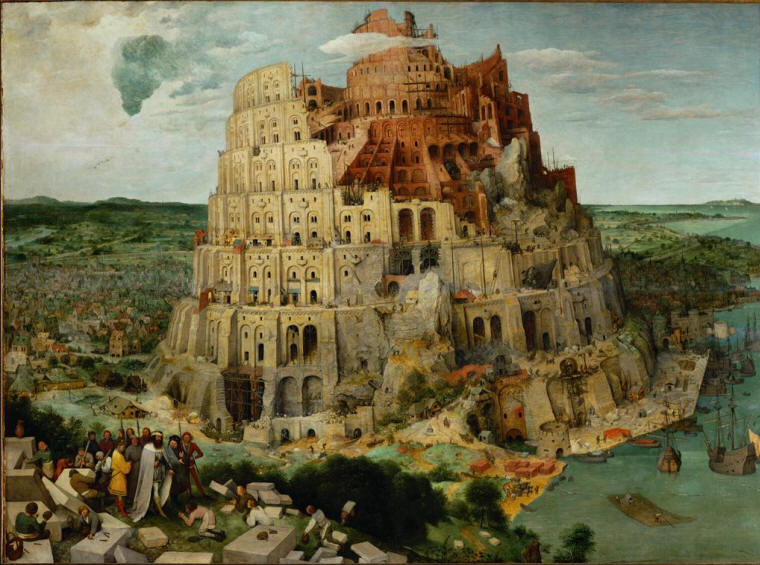
Eric W. Nye, Back to Webliography

Pieter Bruegel the Elder (Flemish, 1525-1569), "Tower of Babel" (1563), Kunsthistorisches Museum, Vienna
Required books:
Revised English Bible with the Apocrypha (Oxford Study Edition). New York: Oxford Univ. Press (ISBN: 0195290003), paper, 1992. Amazon.com: $33.94 new, $9.34 used.
Gabel, John B. and Wheeler, Charles B.. The Bible as Literature: An Introduction. New York: Oxford Univ. Press (ISBN: 0195179072), paper, 5th edn., 2005. Amazon.com: $69.99 new, $19.99 used.
Ferguson, George. Signs and Symbols in Christian Art. New York: Oxford Univ. Press (ISBN 0195014324, paper, 1989. Amazon.com: $15.19 new, $.01 used.
Course Pack in PDF form online
Course Description: More properly titled the Bible as Bible, this course deals with the unique status of that document and its profound influence on the forms of our culture. In the first part of the course we learn techniques of literary close reading through a detailed study of the Pentateuch. We explore the history of text and translation, the relation of doctrine and story, narrative style and literary form, the culture and politics of the ancient mideast, the emergence of the Hebrews as a distinct people consolidated by a book, a law--and how these all affect modes of interpretation. In the second part we extend our study into the sacred texts of the later Hebrew and early Christian traditions, and we review briefly the history of biblical hermeneutics, concentrating our attention on the typological and mythological schools of criticism. Several quizzes, take home exercises, three or four essays, a midterm and a final exam and/or paper are required. Cross-listed with Religious Studies 2500. Prerequisite: WA. From December 2016 this course fulfills the UW College of Arts and Sciences Extended Core graduation requirement for Global Awareness (ASG).
Course Objectives:
1. Comprehend the history of the
language, its grammar and syntax, the arts of rhetoric, and the
conventions of expository writing
2. Read extensively in canonical
literature while learning to question the status and historical
formation of the canon: master literary periods, terms, and major
authors
3. Read intensively with formal concentration, discerning the
quality of different literary modes and styles: know the historical
conventions of literary form and be able to differentiate literary
styles
4. Extend these methods of analysis to new works outside the
canon and to works outside the sphere of conventional textuality
5.
Understand various modes of literary criticism and be able to devise
appropriate critical theses both in writing and conversation: know the
major schools of criticism and be able to replicate their interpretative
strategies
6. Show intelligence, imagination, and creativity in the
formation and support of original literary interpretations
7. Relate the
history of literary creativity to allied fields of humane activity:
politics, arts, philosophy, theory and culture in general.
Grading Standards:
Several take home exercises (numerical, total 5% of final grade) Quizzes on assigned readings (numerical, total 10%) Short essays and presentations (letter-grade, total 35%) Midterm exam (half objective-numerical, half essay letter-grade, total 25%) Final exam (half objective-numerical, half essay letter-grade, total 25%). The final course grade is determined from the weighted total of the above in accordance with usual academic standards (ex: 90-100=A, 80-89=B, etc).
Academic Honesty is strictly enforced according to UW Regulation 6-802 "Procedures and Authorized University Actions in Cases of Student Academic Dishonesty".
The Student Code of Conduct may be found by linking to the Dean of Students Office page.
Welcome video and introduction.
Module ONE: 28 Aug. to 18 Sept. / The Bible and History: Backgrounds and Methods
Online threaded discussion: Biblical Parlance
Introductory Readings: All readings are accompanied by Study Guide Questions in the Course Packet. Ensure that you can address all those questions when you've done your reading.
Introduction to the Course.
Ferguson, "The Reason Why" and "Introduction," pp. 5-9.
Gabel & Wheeler, "To the Reader," pp. vii-x; Ch. 1, "The Bible as
Literature," pp. 1-14.
Abbreviations, etc., Revised English Bible (REB) pp. xxiii-xxvii.
Mary Ann Tolbert, "Reading the Bible," REB pp. *3-*8.
M. Jack Suggs, "Reading This Bible," REB pp. *9-*11.
Essay ONE due 11 September:
Readings on Canon and Culture
Gabel & Wheeler, Ch. 6, "The Formation of the Canon," pp.
91-105.
James A. Sanders, "Communities and Canon," REB pp. *91-*100 .
Gabel & Wheeler, Ch. 3, "Ancient Near Eastern Literature
and the Bible," pp. 42-60; and Appendix II, "Writing in Biblical Times," pp.
364-72.
Choon-Leong Seow, "Literature of the Ancient Near East," REB pp. *57-*67.
Gabel & Wheeler, Ch. 13, "Apocrypha and Pseudepigrapha:
the Outside Books," pp. 206-223.; and Ch. 16, "The Text of the Bible," pp.
268-81.
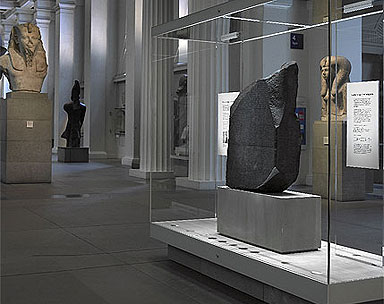
The Rosetta Stone (granite, 196 BC) in the British Museum: the key to Egyptian hieroglyphics
Readings on Ancient History and Literature
Gabel & Wheeler, Ch. 17, "Translating the Bible," pp.
282-305; and Appendix I, "The Name of Israel's God," pp. 359-63.
A Seminar
on the Lindisfarne Gospels at the British Library.
The Gutenberg Bible.
"Editors' Preface" to the REB, pp. xi-xiv.
Donald Coggan, "Preface" to the REB, pp. xv-xvii.
Gabel & Wheeler, Ch. 4, "The Bible and History," pp. 61-72.
W. Lee Humphreys, "Historical Contexts of the Biblical Communities," REB pp.
*33-*47.
David L. Petersen, "The Social World of the Old Testament," REB pp. *68-*78.
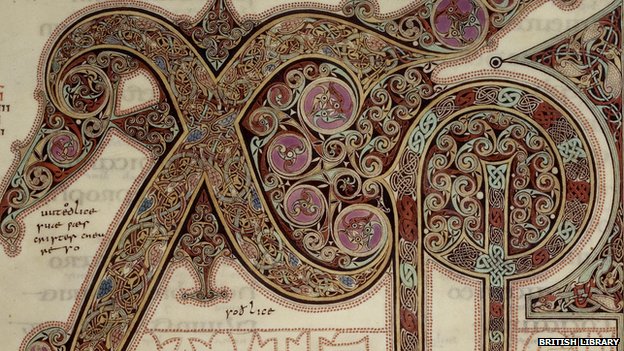
The Chi-Rho monogram from the Lindisfarne Gospels
(c. 700 AD), British Library
Readings on Archaelology and Literary Criticism
Gabel & Wheeler, Ch. 5, "The Physical Setting of the
Bible," pp. 73-90.
Carol Myers, "The Contributions of Archaeology," REB pp. *48-*56.
Leander E. Keck and Gene M. Tucker, "Literary Forms of the Bible," REB pp.
*12-*32.
Gabel & Wheeler, Ch. 2, "Literary Forms and Strategies in
the Bible," pp. 15-41.
Video: Heritage--Civilization and the Jews I.
Module TWO: 19 Sept. to 12 Oct. /Reading the Bible - Jonah and Genesis
Jonah.
John H. Hayes, "Deity in the Biblical Communities and among Their Neighbors,"
REB pp. *141-*53
Gabel & Wheeler, Ch. 7, "The Composition of the
Pentateuch," pp. 106-20.
Richard Elliott Friedman, "Torah and Covenant," REB pp. *154-*63.
"Introduction to the Old Testament," and "The Pentateuch," REB pp. 3-9.
Genesis 1-5.
Genesis 6-26.
Genesis 27-50.
Midterm Exam 13-19 Oct.: you must arrange to have this
proctored
Midterm Exam Part 1 (essay) distributed.
Midterm Exam Part 2 (objective exam) proctored
Module THREE: 20 Oct. to 6 Nov. / Torah and Nebiim: from Egypt to Babylon
Essay TWO due 31 October. Listen to Thomas Tallis's masterpiece of Renaissance polyphony (40 parts), Spem in Alium, based on a Vulgate text from Judith 6:15 and 9:19 as rendered in the Sarum Missal responses. It has been argued that Tallis composed this for Queen Mary Tudor in the 1550s because she was so closely identified typologically with Judith, having beheaded John Dudley, Duke of Northumberland, in order to claim the throne of England in 1553. The more common opinion is that it was sung for Queen Elizabeth's 40th birthday in 1573, she, too, being a type of Judith.
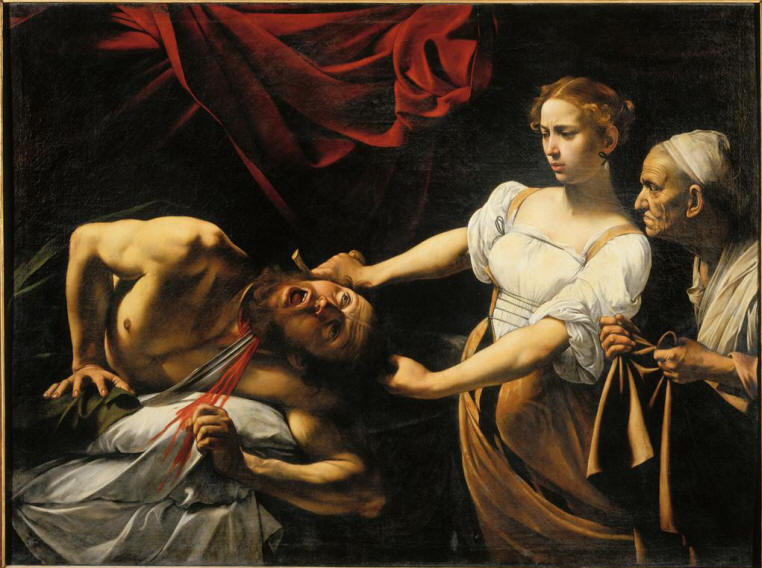
Michelangelo Merisi da Caravaggio (Italian, 1571-1610), "Judith Beheading Holofernes" (1597-98), Galleria Nazionale d'Arte Antica, Rome
Video: Heritage--Civilization and the Jews II.
Reading the Rest of the Torah
Exodus 1-20.
Exodus 32-34, 37
Leviticus 16; Numbers 20-21; Deuteronomy 32-34.
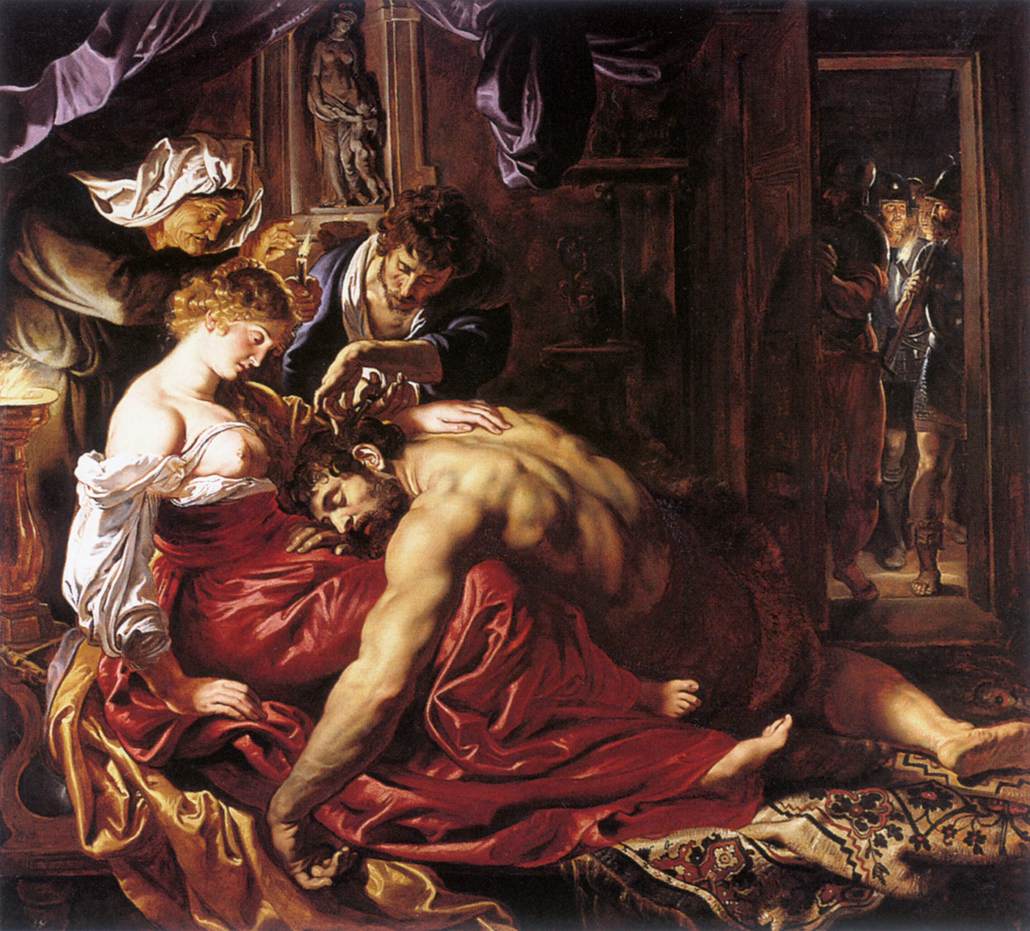
Peter Paul Rubens (Flemish, 1577-1640), "Samson and Delilah"
(1609-10), National Gallery, London
Reading from Promised Land to Divided Kingdoms
Joshua 1-6, 23-24.
Judges 1-2, 4-5, 10, 13-16.
Ruth.
1 Samuel 1-3, 8-10, 15-20, 28-31.
2 Samuel 1, 5-7, 11-12, 15-19.
1 Kings 1-19.
2 Kings 1-2; Amos; 2 Kings 16-25.
Module FOUR: 7 Nov. to 27 Nov. / Kethubim: from Babylon to the Destruction of Jerusalem
Reading the Wisdom Literature
Gabel and Wheeler, Ch. 9, "The Wisdom Literature," pp.
134-51.
Dianne Bergant, "The Perspective of Wisdom," REB pp. *172-*80.
Psalms (esp. 1-3, 8-9, 19-23, 30, 37, 41-51, 72-74, 89-90,
96-99, 103-06, 118, 137, 148).
Job.
Proverbs 1-9, 25-31.
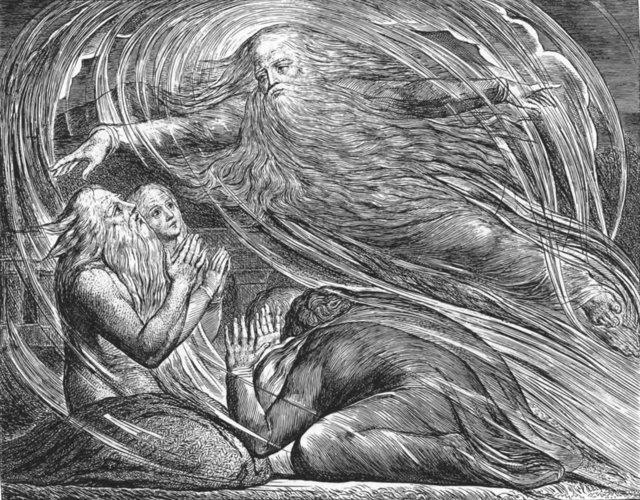
William Blake (English, 1757-1827), "The Lord Speaks to Job out of the Whirlwind, illustration to the Book of Job," engraving on copper plate (1825 ), British Library
Essay THREE, due 7 December
Reading the Prophets
Isaiah 1-13, 36-53.
Gabel and Wheeler, Ch. 8, "The Prophetic Writings," pp. 121-33.
James L. Mays, "The Phenomenon of Prophecy," REB pp. *164-*71.
Ezekiel. Ezra-Nehemiah, Haggai 1-2, Zechariah.
Readings in the Intertestamental Period
Gabel and Wheeler, Ch. 11, "Judaism in the Intertestamental Period," pp. 169-88; and App. III, "Palestine in the
Intertestamental Period," pp. 373-80; and Ch. 12, "The Hellenistic Background of
the New Testament," pp. 189-205.
Carol A. Newsom, "The Dead Sea Scrolls and Other Jewish Literature," REB pp.
*101-*11.
Robert Goldenberg, "Hebrew Scriptures in Early Post-Biblical Judaism, with
Special Reference to the Rabbinic Tradition," REB pp. *122-*28.
Reading the Apocalyptic Literature
Gabel and Wheeler, Ch. 10, "The Apocalyptic Literature," pp. 152-68.
Martha Himmelfarb, "The Apocalyptic Vision," REB pp. *181-*89.
Daniel.
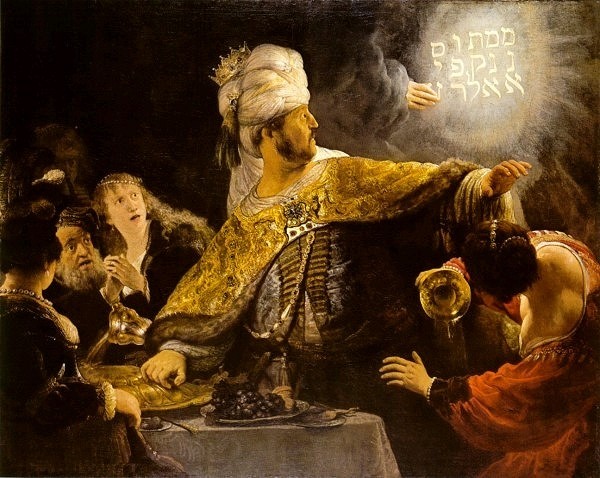
Rembrandt van Rijn (1606�1669), "Belshazzar's Feast" (ca. 1635-39), National Gallery, London
Video: Heritage--Civilization and the Jews III.
Module FIVE: 28 Nov. to 11 Dec. / Typology
and Biblical Interpretation
Final Exam: 12 to 18 December
The Consultants at the UW Writing Center are dedicated to helping writers accomplish their short- and long-term writing goals. They are available to assist all writers with all types of writing at any stage of the writing process. Writing Consultants are trained to support students from all disciplines and backgrounds, and when you visit the Writing Center, your tutor will help you to develop a revision plan that meets your needs and helps you to focus on achieving your goals. Writers may schedule up to two (2) 45-minute consultations per day and a maximum of four (4) consultations per week. During the Fall 2018 semester, the Writing Center will be open Monday-Friday 8:00a-7:00p and Saturday 1:00p-5:00p. Appointments are encouraged, but writers should also feel free to drop-in and work with the next available consultant. To schedule an appointment, visit www.uwyo.edu/writingcenter, or drop by Coe Library 302 to talk to a tutor
Disability Statement: If you have a physical, learning, sensory or psychological disability and require accommodation, please let me know as soon as possible. You will need to register with, and provide documentation of your disability to University Disability Support Services (UDSS) in SEO, room 330 Knight Hall.
Title IX Statement: UW faculty are committed to
supporting students and upholding the University�s non-discrimination
policy. Under Title IX, discrimination based upon sex and gender is
prohibited. If you experience an incident of sex- or gender-based
discrimination, we encourage you to report it. While you may talk to a
faculty member, understand that as a "Responsible Employee" of the
University, the faculty member MUST report information you share about
the incident to the university�s Title IX Coordinator (you may choose
whether you or anyone involved is identified by name). If you would like
to speak with someone who may be able to afford you privacy or
confidentiality, there are people who can meet with you. Faculty can
help direct you or you may find info about UW policy and resources at
http://www.uwyo.edu/reportit
Any changes to the syllabus will be announced in WyoCourses or on this course website, where the date of most recent revision follows:
Last updated Thursday, 11 October 2018
Notify me of corrections or additions,